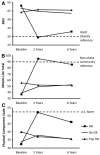Six-year changes in health-related quality of life in gastric bypass patients versus obese comparison groups
- PMID: 22386053
- PMCID: PMC3693474
- DOI: 10.1016/j.soard.2012.01.011
Six-year changes in health-related quality of life in gastric bypass patients versus obese comparison groups
Abstract
Background: Few studies have evaluated the long-term outcomes of bariatric surgery patients in relation to obese individuals not participating in weight loss interventions. Our objective was to evaluate the 6-year changes in health-related quality of life (HRQOL) in gastric bypass (GB) patients versus 2 obese groups not undergoing surgical weight loss. The study setting was a bariatric surgery practice.
Methods: A total of 323 GB patients were compared with 257 individuals who sought but did not undergo gastric bypass and 272 population-based obese individuals using weight-specific (impact of weight on quality of life-lite) and general (medical outcomes study short-form 36 health survey) HRQOL questionnaires at baseline and 2 and 6 years later.
Results: At 6 years, compared with the controls, the GB group exhibited significant improvements in all domains of weight-specific and most domains of general HRQOL (i.e., all physical and some mental/psychosocial). The 6-year percentage of excess weight loss correlated significantly with improvements in both weight-specific and physical HRQOL. The HRQOL scores were fairly stable from 2 to 6 years for the GB group, with small decreases in HRQOL corresponding to some weight regain.
Conclusions: GB patients demonstrated significant improvements in most aspects of HRQOL at 6 years compared with 2 nonsurgical obese groups. Despite some weight regain and small decreases in HRQOL from 2 to 6 years postoperatively, the HRQOL was relatively stable. These results support the effectiveness of weight loss achieved with gastric bypass surgery for improving and maintaining long-term HRQOL.
Copyright © 2012 American Society for Metabolic and Bariatric Surgery. Published by Elsevier Inc. All rights reserved.
Figures

Similar articles
-
Two-year changes in health-related quality of life in gastric bypass patients compared with severely obese controls.Surg Obes Relat Dis. 2009 Mar-Apr;5(2):250-6. doi: 10.1016/j.soard.2009.01.009. Epub 2009 Jan 31. Surg Obes Relat Dis. 2009. PMID: 19306822 Free PMC article. Clinical Trial.
-
12-year trajectory of health-related quality of life in gastric bypass patients versus comparison groups.Surg Obes Relat Dis. 2018 Sep;14(9):1359-1365. doi: 10.1016/j.soard.2018.04.019. Epub 2018 May 9. Surg Obes Relat Dis. 2018. PMID: 29884519
-
Health-Related Quality-of-Life (HRQoL) on an Average of 12 Years After Gastric Bypass Surgery.Obes Surg. 2015 Jul;25(7):1119-27. doi: 10.1007/s11695-014-1513-6. Obes Surg. 2015. PMID: 25566743
-
Plastic surgery after gastric bypass improves long-term quality of life.Obes Surg. 2013 Jan;23(1):24-30. doi: 10.1007/s11695-012-0735-8. Obes Surg. 2013. PMID: 22923310
-
Impact on quality of life, weight loss and comorbidities: a study comparing the biliopancreatic diversion with duodenal switch and the banded Roux-en-Y gastric bypass.Arq Gastroenterol. 2014 Oct-Dec;51(4):320-7. doi: 10.1590/S0004-28032014000400010. Arq Gastroenterol. 2014. PMID: 25591161
Cited by
-
Exercise improves quality of life in bariatric surgery candidates: results from the Bari-Active trial.Obesity (Silver Spring). 2015 Mar;23(3):536-42. doi: 10.1002/oby.20988. Epub 2015 Jan 22. Obesity (Silver Spring). 2015. PMID: 25611582 Free PMC article. Clinical Trial.
-
Changes in quality of life 5 years after sleeve gastrectomy: a prospective cohort study.BMJ Open. 2019 Sep 12;9(9):e031170. doi: 10.1136/bmjopen-2019-031170. BMJ Open. 2019. PMID: 31515432 Free PMC article.
-
Comparing Safety and Efficacy Outcomes of Gastric Bypass and Sleeve Gastrectomy in Patients With Type 2 Diabetes Mellitus: A Systematic Review and Meta-Analysis.Cureus. 2024 Jan 23;16(1):e52796. doi: 10.7759/cureus.52796. eCollection 2024 Jan. Cureus. 2024. PMID: 38389648 Free PMC article. Review.
-
Quality of life after gastric sleeve and gastric bypass for morbid obesity.Porto Biomed J. 2017 Mar-Apr;2(2):40-46. doi: 10.1016/j.pbj.2016.12.006. Epub 2017 Jan 24. Porto Biomed J. 2017. PMID: 32258584 Free PMC article.
-
Screening Risks of Alcohol Abuse, Depressive Symptoms, and Decreased Health-Related Quality of Life in Post-Bariatric Patients and Their Relations to Weight Regain.Obes Surg. 2023 Jun;33(6):1797-1805. doi: 10.1007/s11695-023-06605-3. Epub 2023 Apr 25. Obes Surg. 2023. PMID: 37097429
References
-
- Karlsson J, Sjöström L, Sullivan M. Swedish obese subjects (SOS)—an intervention study of obesity: two-year follow-up of health-related quality of life (HRQL) and eating behavior after gastric surgery for severe obesity. Int J Obes Relat Metab Disord. 1998;22:113–26. - PubMed
-
- Kolotkin RL, Crosby RD, Williams GR. Health-related quality of life varies among obese subgroups. Obes Res. 2002;10:748–56. - PubMed
-
- Dixon JB, Dixon ME, O'Brien PE. Quality of life after lap-band placement: influence of time, weight loss, and comorbidities. Obes Res. 2001;9:713–21. - PubMed
-
- Sullivan M, Karlsson J, Sjostrom L, et al. Swedish obese subjects (SOS)—an intervention study of obesity: baseline evaluation of health and psychosocial functioning in the first 1743 subjects examined. Int J Obes. 1993;1743:503–12. - PubMed
-
- Sarwer DB, Wadden TA, Fabricatore AN. Psychosocial and behavioral aspects of bariatric surgery. Obes Res. 2005;13:639–48. - PubMed
Publication types
MeSH terms
Grants and funding
LinkOut - more resources
Full Text Sources
Medical

